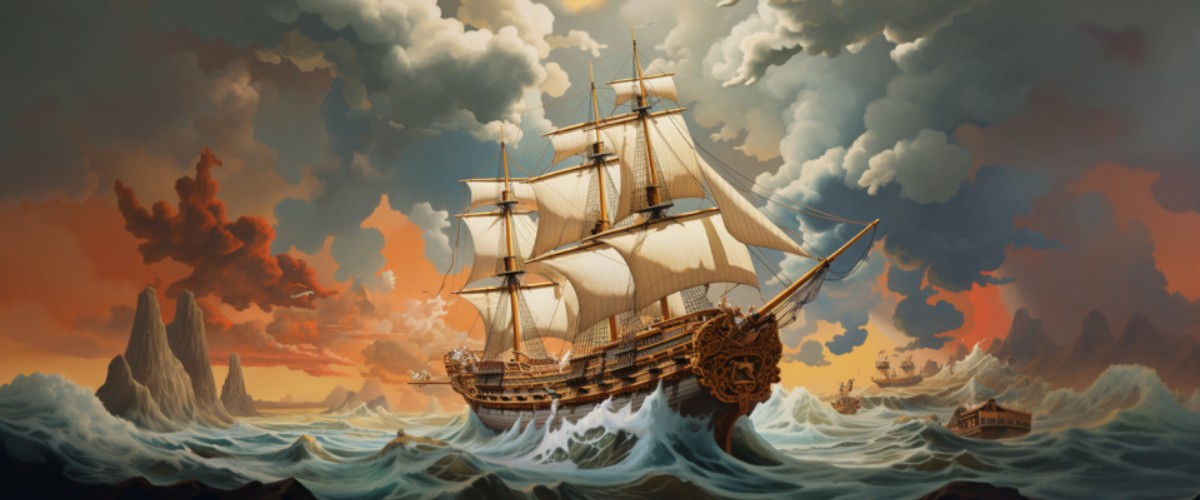The Age of Discovery, spanning from the 15th to the 17th century, unfolded a new chapter in human history, revealing unexplored territories and facilitating interchange between the Old and New Worlds. This epoch is celebrated for pioneering voyages, colossal empires, and the advent of transoceanic trade routes, forever altering global socio-economic and cultural landscapes.
Background: A Tide of Curiosity and Ambition
Setting the Sails of Exploration
- Global Context: Renaissance Europe was an incubator of intellectual curiosity, technological advances, and commercial ambition.
- Technological Innovations: Development of the astrolabe, improvements in cartography, and advancements in ship design facilitated ocean navigation.
- Economic Drivers: The thirst for new trade routes, particularly for spices and silk, drove nations to explore beyond their borders.
Key Figures Propelling Exploration
- Christopher Columbus: Embarked on a voyage in 1492, reaching the Americas and igniting widespread exploration.
- Vasco da Gama: Found the sea route to India around Africa’s Cape of Good Hope, enhancing European-Asian trade.
- Ferdinand Magellan: Initiated the first circumnavigation of the Earth, though he did not complete the voyage himself.
Major Happenings: A Voyage Through Uncharted Territories
- 1492: Columbus reaches the New World, believing it to be Asia.
- 1498: Vasco da Gama establishes a direct maritime route to India.
- 1519-1522: Magellan’s crew completes the first circumnavigation of the Earth.
- Conquests and Colonisations: European powers began colonising regions in the Americas, Africa, and Asia.
- Establishment of Trade Routes: The Spanish and Portuguese set the initial global trade networks, later expanded by the Dutch and English.
Immediate Outcomes: A New World Emerges
Economic and Social Ramifications
- Boosted Economies: The newfound wealth from colonies enriched European economies.
- Slave Trade: A tragic consequence was the rise of the Atlantic Slave Trade, devastating African societies.
Political Outcomes
- Imperial Powers: Nations like Spain and Portugal emerged as powerful colonial empires.
- Treaty of Tordesillas (1494): Divided the New World between Spain and Portugal to avoid conflict over newly discovered lands.
Long-term Impact: Reshaping Human History
Societal and Cultural Evolution
- Cultural Exchange: The Columbian Exchange resulted in the transfer of crops, animals, and technologies between the Old and New Worlds.
- Demographic Shifts: Indigenous populations plummeted due to diseases brought by Europeans, while European populations soared thanks to wealth from colonies.
Economic and Political Consequences
- Wealth and Power Redistribution: The influx of wealth from colonies shifted economic power from the East to Western Europe.
- Colonial Legacies: Established territories later evolved into countries, with borders often reflecting colonial divisions rather than indigenous cultures.
Conclusion: The Enduring Legacy of Exploration
The Age of Discovery, with its entwined threads of curiosity, exploitation, and exchange, etched an indelible mark upon global civilizations. This era fostered connections and confrontations between disparate worlds, the echoes of which reverberate through our globalised society today. While celebrated for the exchange and exploration it heralded, its legacy is also marred by the dark shadows of colonization and oppression. The empires, trade, and cultural diffusion that originated from this age carved pathways that continue to shape our interconnected world, inviting reflection upon its multifaceted impact on the tapestry of human history.








